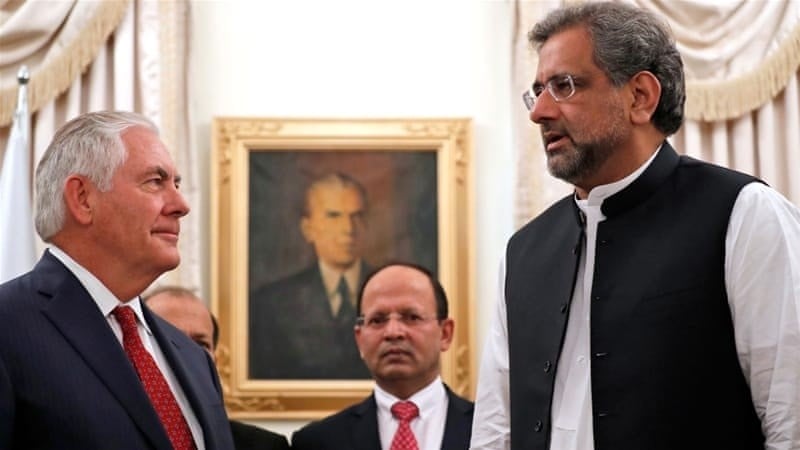

If the first two months of 2018 are any indication, this could be a rough year for Pakistan-US diplomacy. By threatening to block military aid to Pakistan and putting it on a terror-finance list, the Trump administration is employing multiple tactics to pressure Pakistan into sincerely targetting extremist outfits operating in the country. Whether or not such maneuvers will work, remains to be seen. But the rhetoric is tough.
Last week, the US introduced a motion to place Pakistan on the terror-finance list of the Financial Action Task Force, a 37-member global body that combats money laundering and terrorism financing. Washington cited Pakistan’s failure to crackdown on militants who use it as a base for terrorism. So far the FATF has not given into the American motion, but it could at the next meeting in June. In any event, the proposal tabled by the US signaled strained relations between the two countries and reiterated the administration’s commitment to getting tough on Pakistan.
This might not have the desired effect, however. It is also not the first time the US has expressed concerns over Pakistan’s association with global terrorism. Many analysts believe pressure tactics like these would be ineffective, at best.
"I don’t think that coercive pressure would work in favour of the US. It is most likely not going to have a major impact either. Pakistan views relations with Afghan Taliban through the prism of national interest," said Ahsan I. Butt, an assistant professor of policy and government at George Mason University. "The US has some leverage here but the possibility of a major impact is unlikely and overstated," he said in a telephone interview.
Pakistan’s volatile relations with the US go back to the 1980s when the Soviet Union invaded Afghanistan and Washington sought an ally to fight its proxy war against the Kremlin there. The mujahideen guerrillas fighting the Soviets who later evolved into the Taliban received US aid and Pakistan’s support.
Uneducated and unemployed, these fighters became proxies of Pakistan’s secret service, or the ISI, in Kashmir. After 9/11, Pakistan’s military dictator, Pervez Musharraf, chose to be an American ally in the War on Terror after President George W. Bush’s with-us-or-against-us stance. However, elements of the country’s powerful military establishment continued to be accused of close ties with the Taliban.
President Barack Obama also expressed concern over clandestine support for the Taliban, while using the country’s airspace for drone attacks on militants in both Pakistan’s north-western territories and Afghanistan. Yet Obama’s strong words are perceived not nearly as threatening as Trump’s bitter tweet on New Year’s Day that accused Pakistan of betraying the US.
"One positive side effect of having an erratic head of state is that the United States now has a genuine and credible threat to act against Pakistan. America has not been in such a position since 9/11, when it used its position of leverage to coerce Pakistan to facilitate the US invasion of Afghanistan," commented Christine Fair, an associate professor at the Edmund A. Walsh School of Foreign Service at Georgetown University.
Trump’s infamous tweet accused Pakistan of "giving us nothing but lies and deceit" in return for more than $3 billion in aid. In Pakistan, some analysts dismissed it as another impulsive missive from the unpredictable president. Others saw a further deterioration in bilateral relations. Pakistan’s defense ministry, through its own twitter account, rebutted with the statement that the country was an "anti-terror ally" that gave land and air access, military bases and intelligence cooperation in return. Opposition officials criticised the government for taking the insult lying down.
Fair, who has criticised Pakistan for exploiting its secret alliance with militants to its advantage, says that these are unprecedented times in many ways. "Whereas Pakistan had long comforted itself that neither President Bush nor Obama would seriously alter due course, due to the petting zoo of Islamist militants that Pakistan cultivated as crucial tools of foreign policy, and its nuclear weapons, it will now have to seriously consider that Trump means what he says."
Steve Coll, the dean of the Columbia Graduate School of Journalism and the author of two books about the region, says that the present situation must be seen in the historical context of the relations between the two countries. Pakistan, he added, has regained control of its security compared to the "really dark periods" of 2009 or 2008 when hundreds of civilians and military personnel were attacked in suicide bombings by militants. "The Trump administration’s pressure on Pakistan today has to be placed in context. The Pakistan they are pressuring is a more stable, less worrisome Pakistan than the one that the Obama administration faced."
Pakistan, he added, is "fractured, corrupt and weak and so in some respects is ISI." He said that at the very moment when the US wanted to put pressure on Pakistan to get them to stop supporting the Taliban "we were constrained by Pakistan’s own chaos. Because if we put too much pressure on a country with a hundred plus nuclear weapons, it might literally disintegrate," he said. Coll made his remarks in New York at a discussion of his latest book, Directorate S: The CIA and America’s Secret Wars in Afghanistan and Pakistan.
President Trump’s criticism came alongside reports of the US withholding a $225million military aid, later confirmed by a White House National Security Council spokesperson. That, and the country’s name on the terror-finance list, could have serious implications for Pakistan’s struggling economy and reliance on US aid and International Monetary Fund loans. In February, a provincial law minister announced a ban on the two charities run by Hafiz Saeed who was declared a "terrorist" by the UN in 2008. Pakistan also claims to have initiated a crackdown on the Haqqani network, a militant group accused of planning attacks on Afghanistan. It is clear, Butt believes, that "Pakistan is definitely the weaker partner in this relationship."